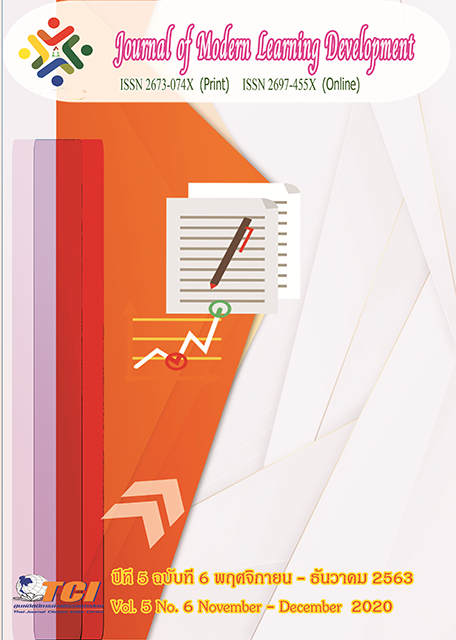การสื่อสารเชิงสุนทรียภาพ : การดำรงอยู่ของภาษาไทยถิ่นใต้ในสถานการณ์ โรคระบาดไวรัสโคโรนาสายพันธุ์ใหม่ 2019
Main Article Content
บทคัดย่อ
บทความนี้มีวัตถุประสงค์เพื่อวิเคราะห์กลวิธีการใช้ภาษาเพื่อการสื่อสารเชิงสุนทรียภาพในสถานการณ์โรคระบาดไวรัสโคโรนาสายพันธุ์ใหม่ 2019 ใช้ผู้บอกภาษาทั้งหมด 78 คน และไม่ใช้เพศเป็นเกณฑ์ในการวิเคราะห์ จากการวิจัยดังกล่าวปรากฏผล 3 ประเด็น ได้แก่ 1. ถ้อยคำที่กล่าวถึงโรคระบาดไวรัสโคโรนาสายพันธ์ใหม่ 2019 พบว่าส่วนใหญ่ไม่มีการกล่าวถ้อยคำที่ตีตราทางสังคม 2. สถานที่ที่ได้รับการกล่าวถึงโรคระบาดไวรัสโคโรนาสายพันธุ์ใหม่ 2019 พบว่าบ้านเป็นสถานที่ที่ได้รับการกล่าวถึงมากที่สุด รองลงมาคือ สังคมและโรงพยาบาล และ 3. สุนทรียรสทางภาษาในโรคระบาดไวรัสโคโรนาสายพันธุ์ใหม่ 2019 พบมากที่สุด คือ ความรัก และความกลัว ตื่นเต้น ตกใจ และพบน้อยที่สุด คือ ความเมตตากรุณาและความขบขัน ผลการวิจัยนี้จึงมีความมุ่งหวังว่าจะช่วยสนับสนุนการจัดการแก้ปัญหาการสื่อสารโรคติดเชื้อไวรัสโคโรนาสายพันธุ์ใหม่ 2019 (COVID-19) และมีประโยชน์ต่อการเลือกใช้ถ้อยคำเพื่อส่งเสริมทัศนคติและความรู้สึกดีทั้งผู้ส่งสารและผู้รับสารอีกด้วย
Article Details
เอกสารอ้างอิง
กรมการจัดหางาน. (2563). กระทรวงแรงงาน เดินหน้ารับข้อสั่งการ นายกฯ มาตรการแรงงานผีน้อย.ออนไลน์. สืบค้นข้อมูล 25 มีนาคม 2563. แหล่งที่มา khttps://www.doe.go.th/prd/main/ news/param/site/1/cat/7/sub/0/pull/detail/view/detail/object_id/32916
กองสุขศึกษา กรมสนับสนุนบริการสุขภาพ กระทรวงสาธารณสุข. (2563). อยู่บ้าน หยุดเชื้อ เพื่อชาติ......ได้อะไรมากกว่าที่คิด. ออนไลน์. สืบค้นข้อมูล 30มีนาคม 2563. แหล่งที่มาhttp://healthydee.moph.go.th/view_article.php?id=723.
กุสุมา รักษมณี. (2549). การวิเคราะห์วรรณคดีไทยตามแนวทฤษฎีวรรณคดีสันสกฤต. (พิมพ์ครั้งที่ 2). กรุงเทพมหานคร: ภาควิชาภาษาตะวันออก คณะโบราณคดี มหาวิทยาลัยศิลปากร วังท่าพระ.
ธนพฤกษ์ ชามะรัตน์. (2561). พหุลักษณ์ของเครือข่ายทางสังคมในการจัดการนาของเกษตรกรอีสานในยุคเปลี่ยนผ่านสู่ประเทศไทย 4.0. วารสารมนุษยศาสตร์สังคมศาสตร์, 35 (3), 216-237.
เปรมฤดี เพ็ชรกูล. (2561). แนวคิดการทำให้อับอายทางออนไลน์และแนวทางเพื่อลดปัญหาการตีตราทางสังคม. วารสารวิชาการมหาวิทยาลัยฟาร์อีสเทอร์น, 12 (3), 9-15.
รัชนีฉาย เฉยรอด. (2562). วิเคราะห์การสูญคำศัพท์ภาษาไทยถิ่นใต้ในคำเรียกสิ่งแวดล้อมทางทะเล. วารสารมนุษยศาสตร์และสังคมศาสตร์ มหาวิทยาลัยมหาสารคาม, 38 (4), 97-108.
รัฐบาลไทย. (2563). ข่าวทันสถานการณ์โควิด-19. ออนไลน์. สืบค้นข้อมูล 29 มีนาคม2563 .แหล่งที่มาhttps://www.thaigov.go.th/news/contents/details/28838 .
อมรา ประสิทธิ์รัฐสินธุ์. (2556). ภาษาศาสตร์สังคม. (พิมพ์ครั้งที่ 5). กรุงเทพมหานคร: โรงพิมพ์แห่งจุฬาลงกรณ์มหาวิทยาลัย.
Bangkokbiznews. (2020). มติ ‘ครม.’ สั่งปิดสถานบริการ พื้นที่ กทม.-ปริมณฑล 14 วัน. Online. สืบค้นข้อมูล 27 มีนาคม 2563. from : https://www.bangkokbiznews.com/news/detail/871146.
MCOT.net. (2020). รัฐขอให้คนเดินทางกลับต่างจังหวัดกักตัวเอง 14 วัน. Online. สืบค้น 27 มีนาคม 2563. from : https://www.mcot.net/viewtna/5e787fa5e3f8e40af442d01f.
Prachachat. (2020). อัพเดท 15 จังหวัด – เมืองพัทยา ปิดเมือง ป้องกันโควิด-19. Online. สืบค้นข้อมูล 11 เมษายน 2563. from : https://www.prachachat.net/general/news-447387.
World Health Organization. (2020). การตีตราทางสังคมที่เกี่ยวข้องกับ COVID-19. Online. สืบค้นข้อมูล 13 เมษายน 2563. from : https://www.who.int/docs/default-source/searo/thailand /covid19-stigma-guide-th-final.pdf


